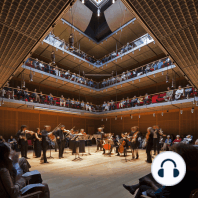20 min listen

176. Piano, with Accompaniment
176. Piano, with Accompaniment
ratings:
Length:
20 minutes
Released:
Oct 15, 2013
Format:
Podcast episode
Description
Works for violin and piano by Benjamin Beilman, violin and Yekwon Sunwoo, piano and wind quintet by Stephen Taylor, oboe; David Shifrin, clarinet; Peter Kolkay, bassoon; William Purvis, horn; and Gilles Vonsattel, piano.Mozart: Violin Sonata in E-flat MajorMozart: Quintet in E-Flat MajorIt’s a curious thing: today, when there is a piano part in chamber music, we tend to think of it as the “accompaniment” to whatever instrument or voice it is paired with. But that was certainly not the case in Mozart’s time, as we’ll hear in the two pieces on today’s podcast.We start with Mozart’s 19th Sonata for piano and violin, in E-flat major. The sonata was published in 1778, when Mozart was 22, as part of a set of six sonatas.These sonatas were actually rather progressive for their time. In the 18th century, it was the norm for the piano to dominate in settings for keyboard and other instruments—sonatas were for “piano and violin,” not the other way around. But in this set Mozart made an effort to treat the instruments more as equals, giving both players a crack at the main themes. Performing the piece, we’ll hear pianist Yē kwon Sunwoo and violinist Benjamin Beilman.In the second work on the program—Mozart’s Quintet for Piano and Winds—often feels like a miniature concerto, with the piano taking the starring role and the wind instruments providing backup. The recording features Gilles Vonsattel on piano with Stephen Taylor on oboe; David Shifrin on clarinet; Peter Kolkay on bassoon; and William Purvis on the French horn. Mozart himself premiered the piece in 1784 and called it, in an oft-quoted letter to his father Leopold, “the best thing I have written in my life.”Mozart was not alone in finding it an especially fetching piece. About a dozen years later another quintet appeared on the scene in Vienna, scored for the same instruments, by a young admirer: Ludwig van Beethoven. As they say, imitation is the sincerest form of flattery.
Released:
Oct 15, 2013
Format:
Podcast episode
Titles in the series (100)
1. Beethoven: Before and After by The Concert - Isabella Stewart Gardner Museum